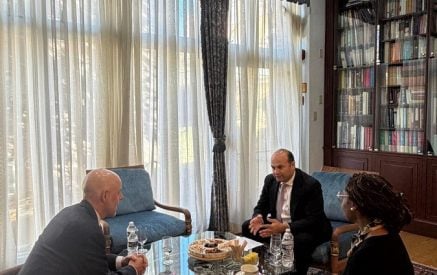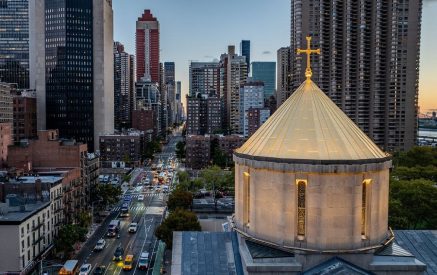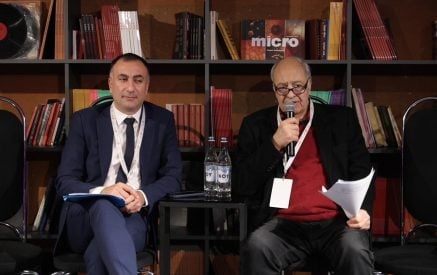by Krikor Sahagian
After only a week of searching for an apartment in Yerevan and dealing with local real estate brokers who thought that an apartment’s value lay in how close it was to a Thai massage parlor, Setrag decided to heed his parents’ advice and give their family home in Ashtarak a try. Months prior to his move, his parents bought a worn-out house outside Yerevan to renovate. The renovation was still incomplete, but there was a bed, and his father assured him with utmost confidence that all Setrag needed was to witness a single sunrise and to let the beauty of the stunning balcony view consume him in order to firmly want to stay in the family home.
I, however, was skeptical. In his 20 years, Setrag had seen much of the most splendid corners of this world. He had seen magnificent sunsets on the shores of Portugal and the crystal beauty of Lake Como in Italy. He had sipped red wine on top of one of the thousands of islands of Greece. He had seen the breathtaking New York skyline, the mountains of Switzerland, the luxury of Dubai, the ceiling of the Sistine chapel and the ancient walls of Jerusalem. As much as I am in love with every inch of Armenia, I believed that this view in Ashtarak that we had never heard of was going to be a hard sell for someone like Setrag, who was surprisingly modest and unpretentious despite his many journeys across the globe.
Read also
Setrag was also the definition of an extrovert. He could not stand being alone for very long. He was so extroverted that, as one of his closest friends, I felt annoyed by how he was not selective with the people he chose to hang out with. Though he had his set of close friends, he was remarkably open about who he spent time with. Whether they were materialists, nerds, aristocrats, ex-convicts, broken people or people so old that they could hardly hear anything, Setrag could, with incredible ease, spend an entire day with anyone. He was funny, witty, smart and knew six languages well. He could hold a conversation with peasants and presidents alike. He loved people, and people loved him.
His gregariousness also caused many of his closest friends like myself a lot of irritability. He would never answer text messages, and he was always late. We all know someone who always runs late, but Setrag was on another level. He would arrive hours late to events he himself planned. In fact, when my friends and I organized our weekly intervention to deal with this problem, he would, as per tradition, light up a cigarette and calmly tell us to stop inviting him. It was Setrag after all—the life of every party. Thus, as per tradition, we would surrender to his whims. However, truth be told, this was another reason nobody wanted him to live in Ashtarak, a town outside Yerevan. Nobody wanted to see this tardiness issue further worsen.
But, again, he was an extrovert, and I found it difficult to believe that he could live in the little town of Ashtarak. I think he himself had difficulty believing it. We assumed, like many diasporan Armenians with a touch of arrogance may assume, that Ashtarak was too far, too primitive and maybe a bit dangerous. Like many, Setrag and I steadfastly carried the dreams of the nation in our hearts—of a bigger Armenia, a more spacious Armenia, an Armenia whose borders extend from sea to shining sea. But, we knew nothing about Ashtarak—a town only 20 minutes from Yerevan’s city center. Was the water supply going to be an issue there? How often did the municipality shut the power off for repair and maintenance? Was there a stable internet connection? Setrag had already moved to Armenia—was that not enough adventure? Why did he need to live in the unfamiliar town of Ashtarak?
But Setrag, despite his scrawny build, was bestowed by God with a dauntless spirit that did not shy away from the unknown. He knew that the house was still under renovation, but since all the essentials were already installed and his parents had already spent two nights there, he believed the house was livable. He was also a good son to good parents, and thus, he decided to go see his family home to evaluate whether living there full time was a possibility. He asked me to join him, and so we went.
I’ll admit, we went at a time that was hardly ideal. Setrag could spare a few hours out of his busy social life to finally visit his family home in the evening, at around 9 p.m., under the drizzling rain. We took a cab and left. Five minutes in, I could already see Setrag overwhelmed by every stimulus while driving on the poorly lit road surrounded by old Soviet cars and neon signs of worn out strip clubs. Since we did not know the way there, naturally, five minutes felt like an eternity—but the cab driver, with impressive consistency and without flinching, told us every few minutes that we were almost there. It was only after the sixth time he said it, that it bore any truth. When we asked him how he knew this time around, he responded that we just passed the Ashtarak town square. We thought it must have been one hell of a grand square if we did not even notice passing through it. Soon after, we started driving on a dirt road squeezed between the oldest houses in the neighborhood. The mud puddles created by the rain almost caused the car to get stuck. It was not exactly the type of reassurance that Setrag was looking for.
With a bit of luck, however, we eventually got to our destination. We were greeted by a pile of construction sand, a single light bulb and a person who would change our lives forever—Shavarsh, the 50-year-old construction manager. We were yet to emerge from the cab, when Shavarsh greeted us with a wide smile and incredible warmth. Since I was skeptical and a bit nervous, I gave him a good firm handshake in hopes of setting the tone of this first encounter. To say that the firm handshake changed anything would be a lie. After a brief comment expressing fatherly disappointment about Setrag’s long hair, Shavarsh told him he was honored to welcome him home.
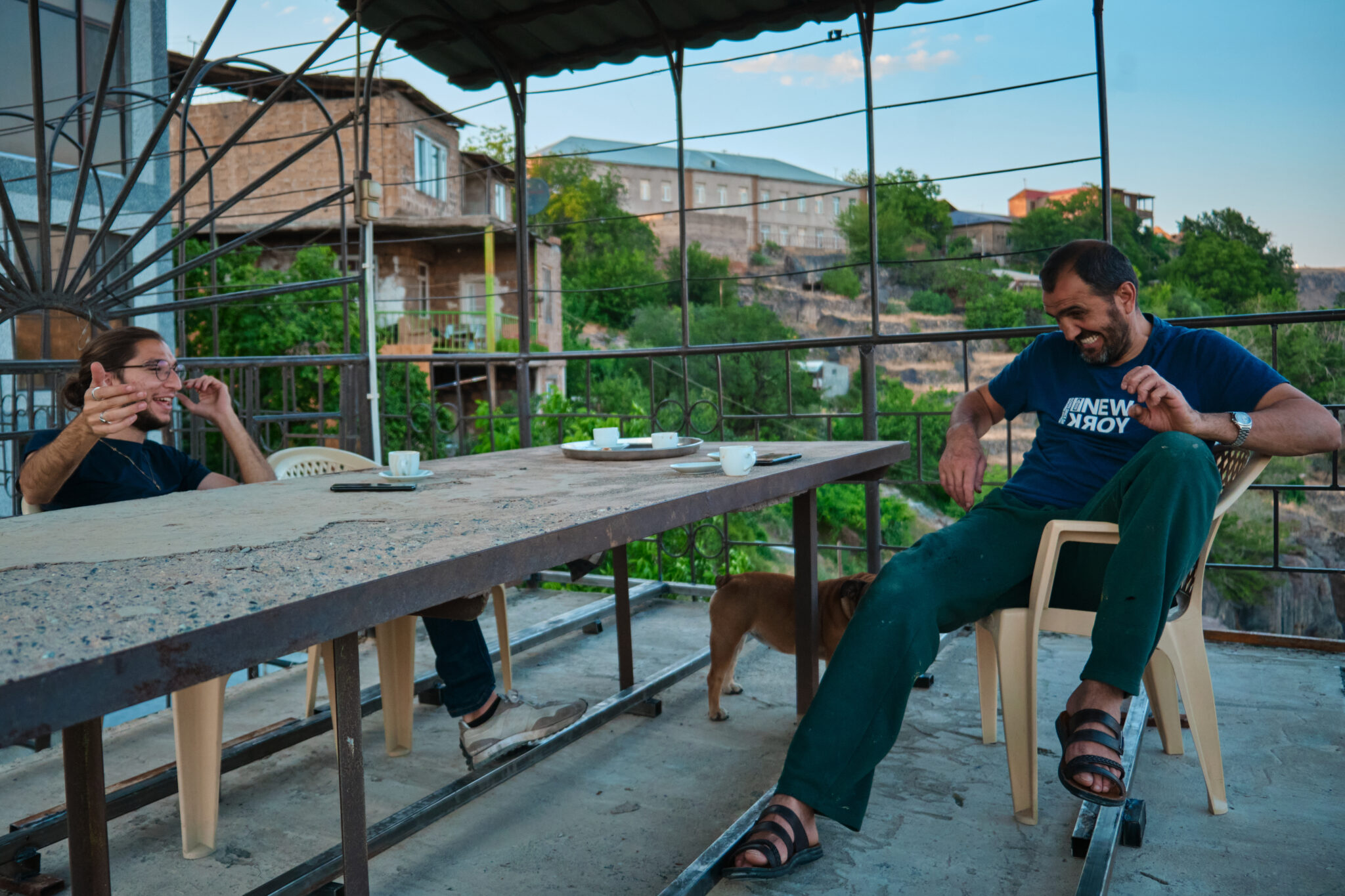
Setrag and Shavarsh having their morning coffee.
When we stepped in the house, we were confronted with a bunch of furniture tucked away in the corner covered with bed sheets. They were placed there by Setrag’s parents to be unpacked once the renovation was completed. Shavarsh proceeded to give us the grand tour and told us about what we assumed were all the things he had finished building in the house. I say assumed, because we could hardly understand him at the time. He was loud, loquacious and spoke with the beautiful Javakhk dialect. He used a lot of construction terminology in Russian that we would not have understood even if he had said them in English or Armenian.
Whatever we understood, we understood not because of the words he used, but because he spoke with his heart and soul. He spoke to us like we were family. Even if we did not understand him, we knew he meant well. Every time Setrag asked him when a certain aspect of the construction would be completed, Shavarsh gave us a confused look, insulted that we had asked such a stupid question. He’d respond, “Tomorrow, of course. We aren’t playing around here.” They had already been working for five months, but with sheer luck, Setrag had arrived only a day before everything was to be completed.
Setrag was never the type of person who looked for comfort or luxury, even though he could have easily obtained both wherever he wanted. In fact, he often would be happy with the bare necessities. Regardless, though, I repeatedly reminded Setrag that he could stay at my place until his family home was ready. At that stage of the renovation, even renting out a small apartment in Yerevan made more financial sense. But, my comments had the opposite effect of testing his ego. The more I insisted, the more he doubled down on wanting to spend at least a night there. Eventually, after 30 minutes of deliberations, he decided to stay the night to see whether the view his father had spoken of so highly of had any merit.
The next day, Setrag woke up and walked out onto the balcony for the very first time. He was awestruck and mesmerized by what he saw—a view that would forever change his life and the meaningful future that it now held. The balcony faced the unparalleled crevice of the Ashtarak gorge and the dark rocky cliffs it was forged out of. On the other side was a school and a small church. At the bottom of the valley, the river Kasakh endlessly flowed, and the sound of the running water brought him a sense of tranquility like never before. In the near distance, an old, captivating pedestrian bridge stood firm and tall, extending across the gorge. It was a beautiful day. It was bright, and a graceful blue color was brushed across the edgeless sky. The soil seemed to shine, and the plants radiated fresh air after a calm night of rain. Setrag was lost for words. With a warm embrace, the land of Armenia had welcomed home one of her many wandering children.
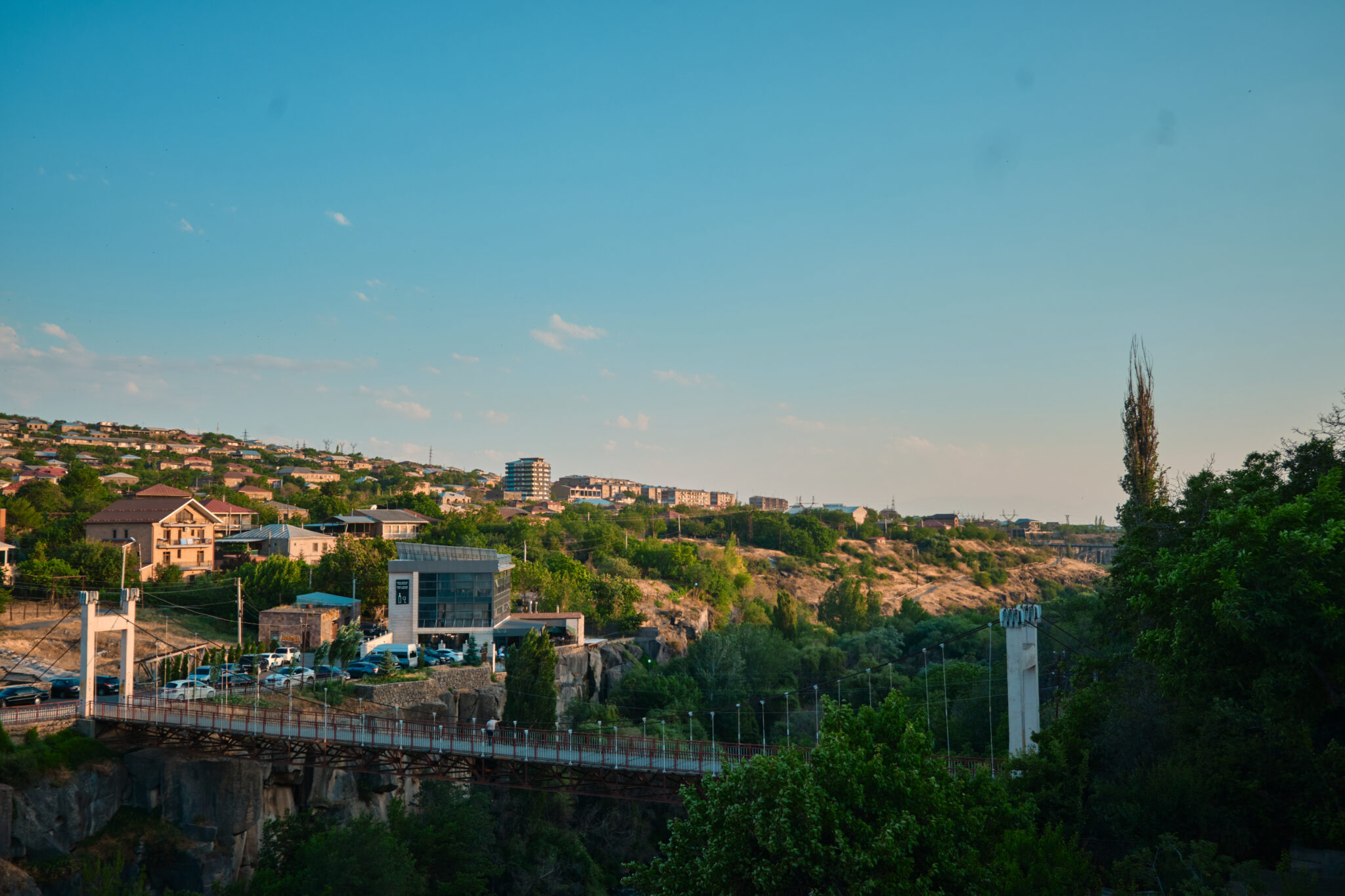
The view Setrag woke up to on his first morning in Ashtarak.
His father, like all fathers, was right. That was all the convincing Setrag needed. Henceforth, the cosmopolitan, extroverted young Armenian, born and raised in the Holy City of Jerusalem, suddenly became one of the 5,000 residents of the town of Ashtarak. Of course, during the first few months, Setrag had to spend a lot of time making this building with four walls a home. Every day, he’d pay a visit to the local market and with a smile, dramatic gesticulations and immense patience, would explain to the store clerk what he needed. When, inevitably, they did not understand, they’d ask some other employee to come and help make sense of what Setrag was asking for.
However, gradually, the house was furnished with pots, pans, towels, hangers, toothbrushes, couches, chairs, carpets, brooms, trash bins, curtains, clothes and dark coffee. Of course, it required time. One could not inorganically force a house to become a home. Plants needed years to grow. Items collected from lived experiences needed to make their way to the many corners and shelves of the house. Wine bottles needed to age and collect dust. Books needed to pile up. The picture of Ararat needed to be hung. A jar full of useless coins needed to be filled. His mom needed to bring Middle Eastern food spices. It took years, but before I knew it, in front of my eyes, the house Setrag had to take care of grew to become a house that took care of him. It had finally become home.
The eminent dream of more than one hundred years had finally come true. Setrag and his family had a home in the homeland.






















































